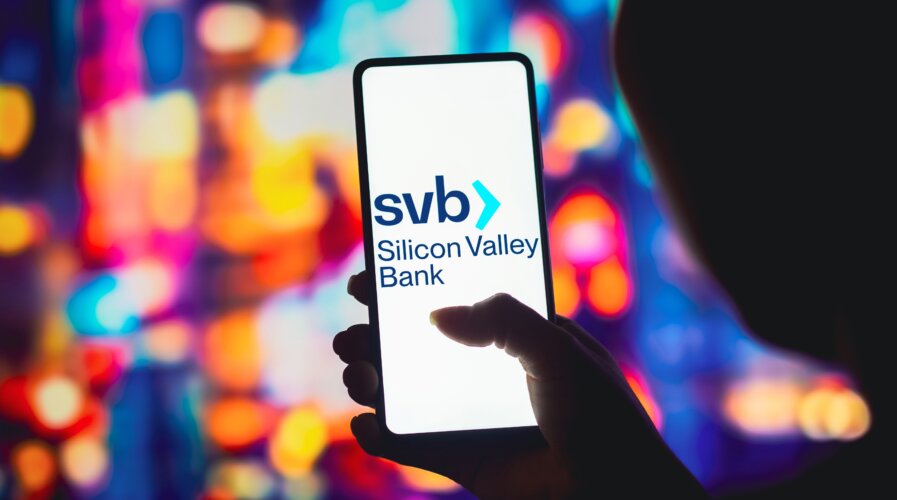
What happens to China tech startups post-Silicon Valley Bank collapse?Source: Shutterstock
What happens to China tech startups post-Silicon Valley Bank collapse?
- SVB is a popular place for many Chinese tech startups and venture capital funds to park their US dollar funds.
- The SPD Silicon Valley Bank, a 50-50 joint venture owned by SVB and local partner Shanghai Pudong Development Bank, stated that its operations were “sound.”
Tech Wire Asia reported on the collapse of Silicon Valley Bank (SVB), based in Santa Clara, California, and how it was seized by the US Federal Deposit Insurance Corporation (FDIC) after a run on the bank over the weekend.
To avoid contagion, the US Treasury, the Federal Reserve, and the FDIC jointly announced on March 12 that depositors of the failed SVB would have access to all of their money starting March 13.
At the same time, the Biden Administration announced new facilities to backstop deposit withdrawals across the banking system. For context, SVB historically played a crucial role in giving Chinese tech startups access to US money.
The bank, which worked with nearly half of all venture-backed tech and healthcare companies in the US before the government took over, also has a Chinese joint venture (JV).
That JV was set up in 2012 and targeted China’s tech elite. Inevitably, the collapse of SVB has caused widespread concern in China. Still, the SPD Silicon Valley Bank, which was 50-50 owned by SVB and local partner Shanghai Pudong Development Bank, said its operations were “sound.”
“The bank has a standardized corporate governance structure and an independent balance sheet,” it said in a statement. “As China’s first technology bank, SPD Silicon Valley Bank is committed to serving Chinese science and technology companies and has always had sound operations in accordance with Chinese laws and regulations.”
According to the corporate database Tianyancha, SVB Financial Group, the parent company of SVB, also has two business consulting firms and one financial services firm in mainland China. It remains to be seen what will happen to SVB’s joint venture ownership.
To put things into perspective, SVB portrayed itself as “the bank of the global innovation economy.” However, contrary to what we may assume, SVB is not investing in highly speculative tech startups or projects. Although it did provide financial services to tech startups, it only lent them a little money since they were often flush with venture capital cash.
Instead, the cash flow went the opposite way, with tech businesses depositing large sums into SVB.
In turn, the bank parked much of that money in “boring, extremely safe assets, mainly long-term bonds issued by the U.S. government and government-backed agencies,” as The New York Times puts it.
Tech startups in China are doing fine
At least a dozen firms have issued statements since SVB collapsed, trying to pacify investors and clients, clarifying their exposure to the lender was limited. Interestingly, most were biotech companies.
On Monday, one of China’s largest cancer-focused drug companies, BeiGene, said it had more than US$175 million in uninsured cash deposits at SVB, representing approximately 3.9% of its cash, cash equivalents, and short-term investments.
“The company does not expect the recent developments with SVB to significantly impact its operations,” it said. Zai Lab, a pharmaceutical firm, announced that its cash deposits at SVB were “immaterial” at about US$23 million.
The closure of SVB “will not have an impact” on the company’s ability to meet its operating expenses and capital expenditure requirements, including payroll, it said. Even the popular selfie app Meitu said it had not held any bank accounts at SVB since 2020. It issued a statement “to avoid any potential public misunderstanding.”
Overall, it is unclear how many China-based startups had SVB accounts besides those companies that have made statements. Experts, however, believe that many China-based startups with US VCs funding have started with bank accounts at SVB.
READ MORE
- Ethical AI: The renewed importance of safeguarding data and customer privacy in Generative AI applications
- How Japan balances AI-driven opportunities with cybersecurity needs
- Deploying SASE: Benchmarking your approach
- Insurance everywhere all at once: the digital transformation of the APAC insurance industry
- Google parent Alphabet eyes HubSpot: A potential acquisition shaping the future of CRM


